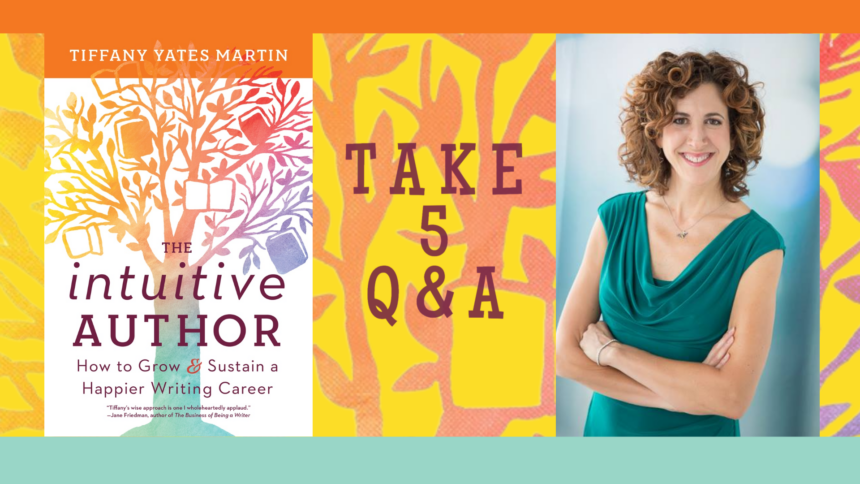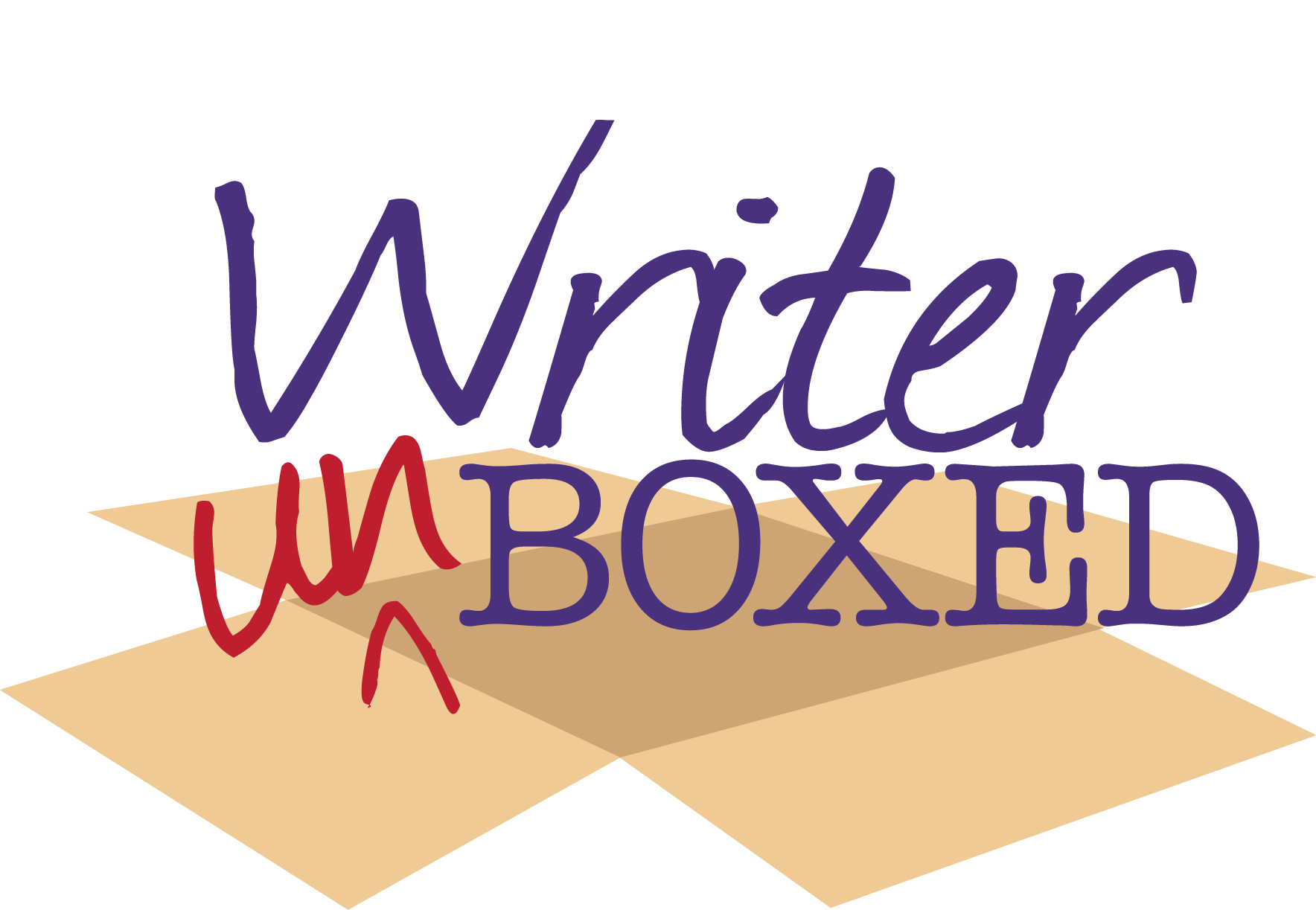Take Five: Tiffany Yates Martin and THE INTUITIVE AUTHOR: HOW TO GROW & SUSTAIN A HAPPIER WRITING CAREER
By Writer Unboxed | October 13, 2024 |

We are thrilled to bring you a sneak peek at the upcoming release from author, editor, teacher, and WU contributor Tiffany Yates Martin. The book, THE INTUITIVE AUTHOR: HOW TO GROW & SUSTAIN A HAPPIER WRITING CAREER, is out this Tuesday (Oct.15) in trade, e-book, and hardcover, with an audiobook releasing in November. It seems tailor made for us, the WU community, and is already receiving great buzz, such as:
“Intuitive Author is a much-needed resource, filled to the brim with wisdom and tips that every author needs to know. It should be required reading and belongs on every author’s bookshelf.”—Amy Collins, literary agent, Talcott Notch
Interested in hearing more? Here’s Tiffany!
Q1: What’s your new book about?
TYM: That of all the skills writers strive to master in our field, the ones that most directly affect the success and longevity of an author’s career aren’t about writing.
Yes, a writing career rests on a solid foundation of “hard skills” in story and writing craft knowledge, but what sustains it–and the author–are what I call the “squishy skills”—things like:
- how to handle rejection and criticism
- how to adapt to an ever-changing publishing market
- how to find your authentic voice as an author
- how to handle the common “writer demons”: impostor syndrome, competition, comparison, procrastination, fear of failure, “writer’s block,” and a host of other demons that live in all of our psyches, but perhaps most acutely in creatives.
Essentially the book is about how to take control and feel a sense of agency in an industry where often it feels as if the author has the least amount of influence over the trajectory of their career.
Q2: What would you most like people to understand about your book?
TYM: This is survival guide for authors, a book that brings the same practical, actionable approach I used in my previous book for authors about editing and revising their own work, Intuitive Editing, to these “squishy skills” areas.
Having the tools and skills to handle these oh-so-common challenges and potential pitfalls that can derail you as a writer is what allows authors to create and sustain a more satisfying, fulfilling career despite the business’s many ups and downs. It allows authors to take the helm of the career they want, rather than feeling buffeted about by the many factors we can’t control in our industry.
Q3: We’d ask “What do your characters have to overcome in this story?” but since this is nonfiction–
TYM: Ha… Writing is filled with constant challenges writers must overcome: competing for eyeballs against the two million other books published every year; dwindling advances and an ever more challenging publishing and sales environment; escalating marketing and publicity demands; artificial intelligence—the list is vast and always expanding.
And that doesn’t even include our inner obstacles: the “writer demons” like impostor syndrome, comparison, procrastination, “writer’s block”; maintaining motivation and focus; balancing our art with our lives and our own well-being—it’s another list that can often feel endless.
Amid all that, the challenge is to concretely define why you write, what you value, and what is your enough so that you can take charge of your writing career in an industry where creativity and artists are often treated as expendable, interchangeable commodities.
When I talk about building a successful writing career, I’m not talking about how much money you make, or whether you’re published or a full-time writer. If you write, and pursue avenues for sharing your writing, then you are building a writing career. You don’t have to be validated or legitimized as a writer by artificial external metrics of “success.”
I’m talking about navigating a path for yourself and your writing on your own terms, one that looks the way you want it to, and offers you creative satisfaction and freedom—regardless of the inevitable slings and arrows of our business. Those elements are not within our control—but our art and our careers and how we run them absolutely are.
Learning how to take that agency and sense of power and autonomy in our careers is the core factor that separates those who have the resilience to sustain a career that brings them joy and fulfilment for the long term, from those who may flounder, flame out, or give up.
Q4: What unique challenges did this book pose for you, if any?
TYM: This wasn’t actually the book I set out to write. I was about a third of the way through drafting a deep-dive book on character when I realized I was hearing more and more authors talk about the ever-changing, ever more complex, ever more challenging world of writing and publishing. I saw them feeling discouraged, disheartened. I heard them talk about feeling unmotivated or irrelevant or exhausted.
I heard some writers talk about giving up, leaving this career they love.
I started writing and talking and presenting more and more on these issues, working out ways for authors to navigate these often amorphous challenges, because while countless resources exist about how to measure the hard skills, there didn’t seem to be much about the squishy skills–especially in a business where keeping up the appearance of success often feels like a mandate.
And I began to realize that the book I really wanted to write right now was about that. Even though the character book was fully outlined, partially written, and publicly promised, I shifted gears and turned my focus to this one that I felt more urgently compelled to write.
Q5: What has been the most rewarding aspect of having written this book?
TYM: Without question it’s been hearing authors seem to exhale at the validation and acknowledgment of how tough the industry is right now, how hard it is to create and sustain a flourishing, satisfying career. It’s been hearing feedback about these tools and techniques I’ve been developing for years in my blogs, articles, presentations, and speaking engagements that they find helpful, useful, and that give them a sense of taking back the captain’s seat of their own career.
And honestly, it’s in getting another heart project out into the world. Intuitive Editing felt like the culmination of my life work as an editor, a long-held passion project. I thought I’d never write anything as personally significant to me—and yet I find this book is equally meaningful, and I’m every bit as excited and proud to share it with authors.
WU Community, you can learn more about Tiffany’s new book on her website, or by following her on Facebook or IG, or by following the buy-links below. Read on, and keep learning and growing!










Hey Tiffany — First, thanks for so ably adapting our usual T5 questions about story to the story of your awesome new book. Also, yes–it can feel so disheartening out there. Which can be exhausting. It can be tough to remember why we do this. It’s astute of you to sense the need, and commendable that you’ve addressed it. I just preordered, and I’ll thank you in advance for the writerly sustenance. Wishing you the best with it!
Thanks, Vaughn! And thanks for letting me share the book with the WU community. I’m excited about it, and I hope it’s helpful to authors.
Hi Tiffany, I still have a note you wrote a long while back…after a workshop. You liked the premise of my novel and wrote encouraging words. Now this, your latest endeavor, will fill a need for many writers, as I honor and love the point you make: anyone who thinks being a writer is about making money…should find a different pathway. Writing is about late nights and rejection; a day filled with light when the words come onto the page; a kind remark from a FB friend…and long hours of working and rewriting. Your book will help many along the way. Congrats!! Beth
Thanks, Beth! And I love the intrinsic rewards you get from your writing. Artists deserve to be paid for their art, and the hope is that we all will. But the process is the part we can exercise control over, and if we can derive our core satisfaction from that, it gives us the resiliency we need to keep working toward that goal.
I was lucky enough to read an early copy of this book, and it’s stuck with me ever since. What really hit home was Tiffany’s take: Somewhere along the way, we writers can get a little off track—not because we aren’t good at what we do, but because the industry can feel so overwhelming. As the gap between what we dream of and what we actually face widens, things can start to feel impossible. That’s where Tiffany’s book comes in. Because maybe it all comes back to those early, off-base ideas we had about what our writing career *should* look like and with just a little shift in how we see things, we can set ourselves back on course.
I highly recommend Tiffany’s book!
Tiffany, congratulations. I know your book will find a whole league of grateful writer-readers.
Therese, your words mean a lot. Thanks, friend. And thanks for this community you’ve created and invited me into. <3
Hey Tiffany.
Congratulations! Can’t wait to read it.
Thanks, Bob!